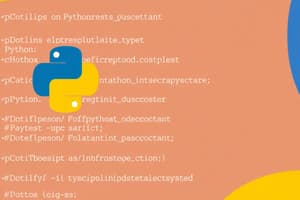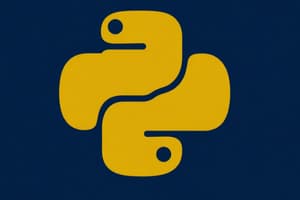Podcast
Questions and Answers
What is the order in which operations are computed called?
What is the order in which operations are computed called?
- Calculation hierarchy
- Evaluation sequence
- Precedence (correct)
- Operation rank
What is the result of the expression 1 + 3 * 4?
What is the result of the expression 1 + 3 * 4?
- 13 (correct)
- 7
- 19
- 15
Which operators have a higher precedence than + and -?
Which operators have a higher precedence than + and -?
- **, /, %
- *, /, %
- *, /, **, %
- **, *, /, % (correct)
How can the order of evaluation be forced in an expression?
How can the order of evaluation be forced in an expression?
What is the purpose of the ** operator in an expression?
What is the purpose of the ** operator in an expression?
What is the result of the expression 2 * 3 + 4?
What is the result of the expression 2 * 3 + 4?
What is the primary goal of Uniform Cost Search?
What is the primary goal of Uniform Cost Search?
What is the purpose of the helper function 'Path cost' in Uniform Cost Search?
What is the purpose of the helper function 'Path cost' in Uniform Cost Search?
In what order are elements popped from the priority queue in Uniform Cost Search?
In what order are elements popped from the priority queue in Uniform Cost Search?
What is the criterion used to break ties in Uniform Cost Search?
What is the criterion used to break ties in Uniform Cost Search?
What is the main difference between Uniform Cost Search and Breadth-First Search?
What is the main difference between Uniform Cost Search and Breadth-First Search?
When should Uniform Cost Search be used?
When should Uniform Cost Search be used?
What is the main characteristic of Uniform Cost Search?
What is the main characteristic of Uniform Cost Search?
What is the role of the priority queue in Uniform Cost Search?
What is the role of the priority queue in Uniform Cost Search?
How is the total cost of a path calculated in Uniform Cost Search?
How is the total cost of a path calculated in Uniform Cost Search?
What is the advantage of using Uniform Cost Search over Breadth-First Search?
What is the advantage of using Uniform Cost Search over Breadth-First Search?
Flashcards are hidden until you start studying
Study Notes
Relational Operators
- Many logical expressions use relational operators.
Logical Operators
- These operators return true or false.
Indentation in Python
- Python provides no braces to indicate blocks of code for class and function definitions or flow control.
Basic Operators
- Arithmetic operators used in Python:
- Addition, subtraction/negation: +
- Multiplication: *
- Division: /
- Modulus (remainder): %
- Exponentiation: **
- Precedence of operators:
- *, /, %, ** have higher precedence than +, -
- Use of parentheses:
- Can be used to force a certain order of evaluation.
- Example calculation:
- 1 + 3 * 4 is 13
Intelligent Agents
- Intelligent agents are a type of artificial intelligence that can perceive their environment and take actions to achieve a goal.
State Representation
- No notes provided for this topic.
Problem Formulation
- No notes provided for this topic.
Solving Problems By Search
- No notes provided for this topic.
Search Strategies
- Breadth-First Search (BFS)
- Properties:
- Completeness: Yes, if b is finite, a solution will be found if exists.
- Time Complexity: bd+1 (nodes until the solution)
- Space Complexity: bd+1 (keeps every generated node in memory)
- Optimality: Yes, if cost = 1 per step
- Not suitable for searching large graphs due to high time and space complexity.
- Properties:
- Uniform-Cost Search (UCS)
- Visits the next node which has the least total cost from the root, until a goal state is reached.
- Similar to BFS, but with an evaluation of the cost for each reachable node.
- g(n) = path cost(n) = sum of individual edge costs to reach the current node.
- Properties:
- Completeness: Yes, if b is finite, and step cost is positive.
- Time Complexity: much larger than bd, and just bd if all steps have the same cost.
- Space Complexity: as above.
- Optimality: Yes.
- Requires that the goal test being applied when a node is removed from the nodes list rather than when the node is first generated while its parent node is expanded.
- Use a priority queue (least cost first) and pop the element with least cost.
- If two elements have the same cost, use alphabetic order.
- Depth-First Search (DFS) and Depth-Limited Search are not detailed in this text.
- Iterative Deepening is not detailed in this text.
Uniform Cost Search
- Use a priority queue (least cost first) and pop the element with least cost.
- If two elements have the same cost, use alphabetic order.
- Helper function: Path cost calculates the total cost of a path.
Summary
- Breadth-First Search (BFS) and Depth-First Search (DFS) are the foundation for all other search techniques.
- Uniform-Cost Search is used when actions have varying costs and the least cost solution is required.
- This is the only uninformed search that worries about costs.
Studying That Suits You
Use AI to generate personalized quizzes and flashcards to suit your learning preferences.




